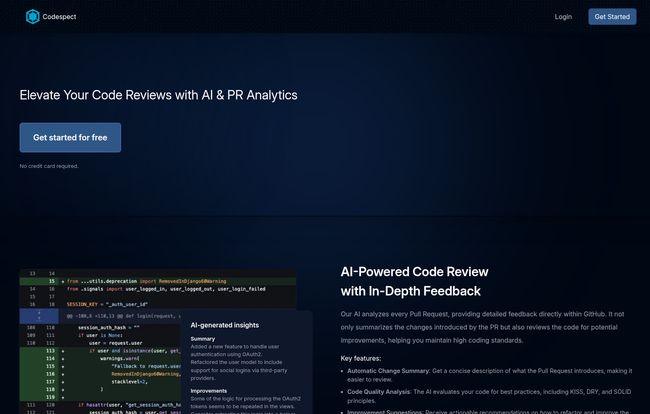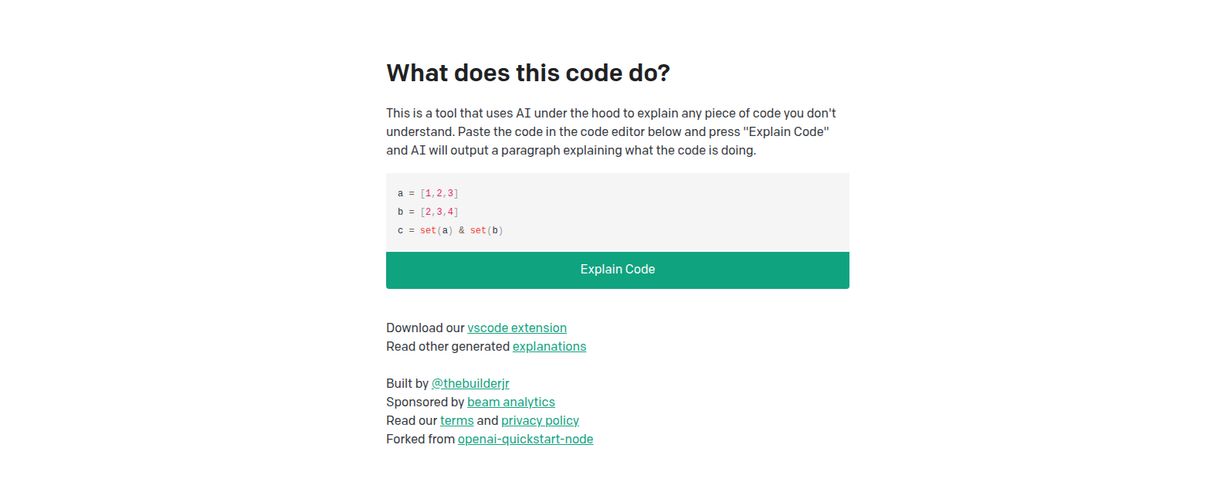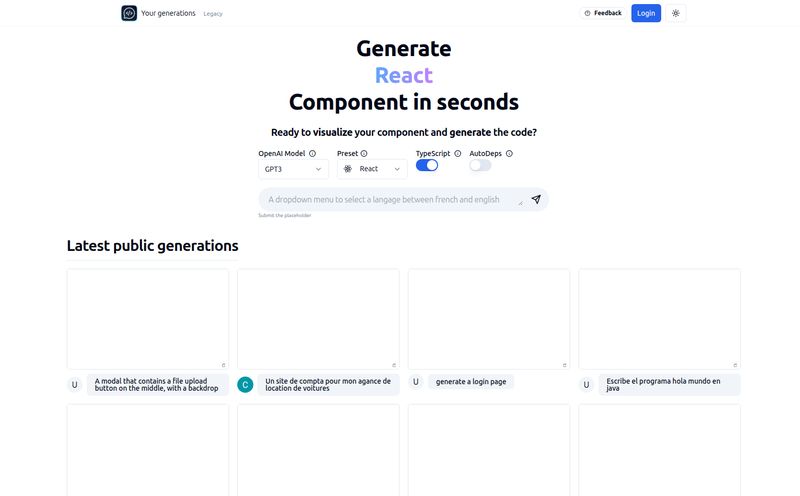Pull Requests can be the absolute worst part of a developer's day. You’ve just spent hours, maybe even days, wrestling with a problem, crafting what you believe is an elegant solution. You push it up, create that PR, and then… you wait.
And wait.
Maybe your lead developer is swamped. Maybe your teammates are in different time zones. When the feedback finally trickles in, it’s a mixed bag. You get some great architectural advice, but you also get three comments about a missing comma in a comment block and a debate over variable naming conventions. It’s a bottleneck. It’s subjective. And sometimes, it just feels like a drag on momentum.
I've been on both sides of that fence for years, both as a dev and as someone managing traffic and project flow. The cost of slow, inefficient code reviews isn't just developer frustration; it's delayed features, slower time-to-market, and mounting tech debt. So, when a new tool called Codespect popped up on my radar, claiming to use AI to streamline this whole mess, my curiosity was definitely piqued. An AI-powered code review tool for GitHub? Sounds like science fiction, but here we are.
So, What Exactly is Codespect?
At its core, Codespect is an automated assistant that lives inside your GitHub workflow. Think of it as a tireless, incredibly fast junior developer who jumps on every single Pull Request the moment it’s created. It doesn’t need coffee, it doesn’t get tired, and its sole purpose is to give your code a first pass before a human ever has to look at it.
It automatically analyzes the changes in a PR and posts a comment, just like a human reviewer would. This comment includes a neat summary of the changes, an assessment of the code quality, and a list of actionable suggestions for improvement. It’s all powered by ChatGPT, which means the feedback is surprisingly articulate and context-aware. The goal isn't to replace your senior devs, but to free them from the tedious, low-level stuff so they can focus on the big picture: architecture, logic, and overall strategy.
Why We Desperately Need to Fix the Code Review Process
I remember one project where we had a feature stuck in PR-limbo for over a week. A week! It was a critical update, but the two senior engineers qualified to approve it were tied up in back-to-back meetings and firefighting other issues. By the time they got to it, the comments were so extensive that it led to a significant refactor, which then had to go through the whole review cycle again. The whole process was demoralizing.
This isn't a unique story. It happens everywhere. The dependency on a few key people creates huge bottlenecks. Furthermore, human reviews can be inconsistent. One person might be a stickler for SOLID principles, while another might only care about performance. This leads to code that reflects the reviewer's personal style more than a consistent team standard. And let's not even talk about the classic “LGTM” (Looks Good To Me) approval on a 1,000-line PR that you know nobody actually read thoroughly. We've all seen it.
This is the problem space where a tool like Codespect aims to make a real difference. It provides an objective baseline for every single PR.
A Look at Codespect’s Standout Features
Alright, let's get into the meat of it. What does this thing actually do? I poked around its features, and a few things really stood out to me from a practical, day-to-day workflow perspective.
The AI Code Reviewer: Your New Pair Programmer
This is the main event. As soon as you open a Pull Request, Codespect gets to work. Its AI-generated comment is broken down into a few parts:
- Change Summary: A plain-English summary of what the PR is trying to accomplish. This is amazing for reviewers who need to get up to speed quickly.
- Code Quality Analysis: The AI evaluates your code against established best practices. The website mentions things like KISS (Keep It Simple, Stupid), DRY (Don't Repeat Yourself), and SOLID principles. This is the kind of stuff that separates clean, maintainable code from future technical debt.
- Improvement Suggestions: This is where the magic happens. It provides concrete, actionable recommendations on how to refactor and improve the code, all in real-time.
Having this automated first pass means that by the time a human reviewer sees the PR, all the low-hanging fruit—style issues, obvious anti-patterns, lack of clarity—has already been flagged. It's a game-changer for efficiency.

Visit Codespect
Insightful Pull Request Analytics
As someone who lives and breathes data for traffic generation, this feature resonates with me. Codespect provides detailed statistics on your pull requests. You can track metrics over time, like review duration, time to merge and team performance. This isn’t about micromanaging your developers; it’s about identifying systemic problems in your workflow. Are PRs consistently getting stuck with one team? Is the review time creeping up? These analytics provide the data you need to have informed conversations about improving your process, rather than just going off of gut feelings.
The Unified Code Review Cockpit
The “Code Review Cockpit” seems to be a central dashboard that gives you a high-level view of all ongoing code reviews. Instead of hunting through GitHub notifications and tabs, you get a single place to see the status of everything. For a team lead or project manager, this is fantastic. It helps you spot bottlenecks and ensure that nothing falls through teh cracks. It’s about bringing order to the chaos of a busy sprint.
My Honest Take on Using Codespect
Okay, so it sounds great on paper. But what’s the reality? Based on my analysis and experience with similar AI tools flooding the market, here’s my balanced take.
The upside is massive. The time-saving aspect is undeniable. Automating the initial review pass can easily save hours per developer per week. That's time they can spend on what really matters: solving complex problems. It also democratizes knowledge. A junior dev gets immediate feedback on best practices, which is an incredible learning tool. It acts as a patient mentor that helps them level up their skills with every PR. The objectivity is another huge plus. An AI doesn’t have a bad day. It doesn’t play favorites. It holds every piece of code to the same standard, which is fantastic for building a consistent and high-quality codebase.
However, let's be real. This is not a silver bullet. An AI, no matter how smart, lacks true context. It won't understand the specific business logic or the subtle trade-offs you had to make for a deadline. I've seen AI tools give suggestions that were technically correct but functionally wrong for the product's goals. You'll likely get some false positives or suggestions that just aren't relevant. It’s a powerful assistant, but it’s not a replacement for an experienced human reviewer who understands the why behind the code. You still need that final human sanity check.
Let's Talk Money: What's the Price of Codespect?
This is often the big question, right? Interestingly, the Codespect website is pretty clear: "Get started for free" and "No credit card required." The official pricing page URL seems to be missing, which tells me a couple of things. It's likely in an early-access or beta phase, where they're focused on user acquisition and feedback rather than monetization. Or, they plan to operate on a freemium model, with a generous free tier for individuals and small teams and paid plans for larger enterprises with more advanced needs.
Frankly, this is the best-case scenario for trying it out. There’s zero risk. You can integrate it into a personal project or a non-critical work repository and see if the value is there for you before committing a single dime.
Who Should Give Codespect a Spin?
So, who is the ideal user for a tool like this? I see a few clear profiles:
- Small to Medium-Sized Teams: Teams that don't have enough senior developers to go around will see an immediate benefit. It eases the burden on leads and helps standardize quality across the board.
- Solo Developers & Freelancers: If you're working alone, you don't have the luxury of a second pair of eyes. Codespect can be that sanity check to catch silly mistakes and push you to write cleaner code.
- Fast-Paced Startups: When speed is everything, you can't afford to be bogged down by a slow review process. Automating the first line of defense helps you maintain velocity without sacrificing quality entirely.
- Open Source Projects: For maintainers of open source projects, this could be a godsend for managing contributions from a wide range of developers with varying skill levels.
FAQs About Codespect
Is Codespect a replacement for human code reviewers?
Absolutely not. It's a powerful assistant designed to augment human reviewers, not replace them. It handles the repetitive, low-level checks, freeing up humans to focus on high-level architecture, business logic, and complex problem-solving.
How does it integrate with GitHub?
It appears to be a direct GitHub App integration. You authorize it for your repositories, and it automatically starts analyzing new Pull Requests and posting comments, just like a team member would.
What programming languages does Codespect support?
The example on their site shows Python, but given its use of a powerful LLM like ChatGPT, it's highly likely to support a wide range of popular languages like JavaScript, TypeScript, Java, Go, and more. You'd probably want to test it on your specific stack.
Is Codespect really free?
Currently, it's advertised as free to get started with no credit card required. This suggests it's either in a promotional beta period or will have a permanent free tier. For now, you can try it without any financial commitment.
How does this compare to GitHub Copilot?
They solve different problems. GitHub Copilot is an AI pair programmer that helps you write code by suggesting completions and entire functions. Codespect is an AI code reviewer that helps you improve code that has already been written by analyzing it within a Pull Request.
The Final Verdict
So, is Codespect worth your time? In my opinion, it's a resounding yes. The world of software development is being transformed by AI, and tools that intelligently automate tedious parts of our workflow are where the biggest productivity gains are. Code review has been a prime candidate for disruption for a long time.
While it's not a magic wand that will solve all your problems, Codespect represents a significant step in the right direction. By providing instant, objective, and helpful feedback on every PR, it has the potential to speed up your development cycle, improve your code quality, and make your developers' lives just a little bit easier. And since you can try it for free, there's really no reason not to give it a shot. You might be surprised at how much you like having an AI on your team.
References and Sources
- Codespect Official Website - The primary source for features and information.
- GitHub Copilot - For comparison on AI developer tools.



